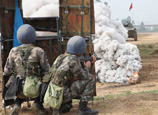
BEIJING, Jan. 8 (Xinhua) -- Despite counting itself among China's "partners," the United States has failed to follow through on its promises.
Last week, the U.S. decided to maintain its controls on satellite exports to China, a decision that came less than a month after it pledged to export more high-tech products for civilian use to the Asian nation.
While relaxing satellite export restrictions for other countries, the White House upheld its controls for China. The move runs counter to the pledge the U.S. made at the 23rd China-U.S. Joint Commission for Commerce and Trade at the end of 2012.
The two countries define their relationship as "partners," but the jittery U.S. obviously believes the restriction will prevent China, which it perceives as its top rival in the Asia-Pacific region, from improving its own technologies and thus becoming a threat.
However, the concerns are without merit. On various occasions, China has reaffirmed its commitment to peaceful development, and its relations with other countries offer proof in this regard.
In fact, this kind of strategic thinking on the part of the U.S. is what's worrying. In the past year, it has started to shift its security priorities to the Asia-Pacific region and taken a more active part in the region's affairs.
 |














 1.8 million students have taken NEEP. What motivate them to continue study rather than work?
1.8 million students have taken NEEP. What motivate them to continue study rather than work?


![]()
